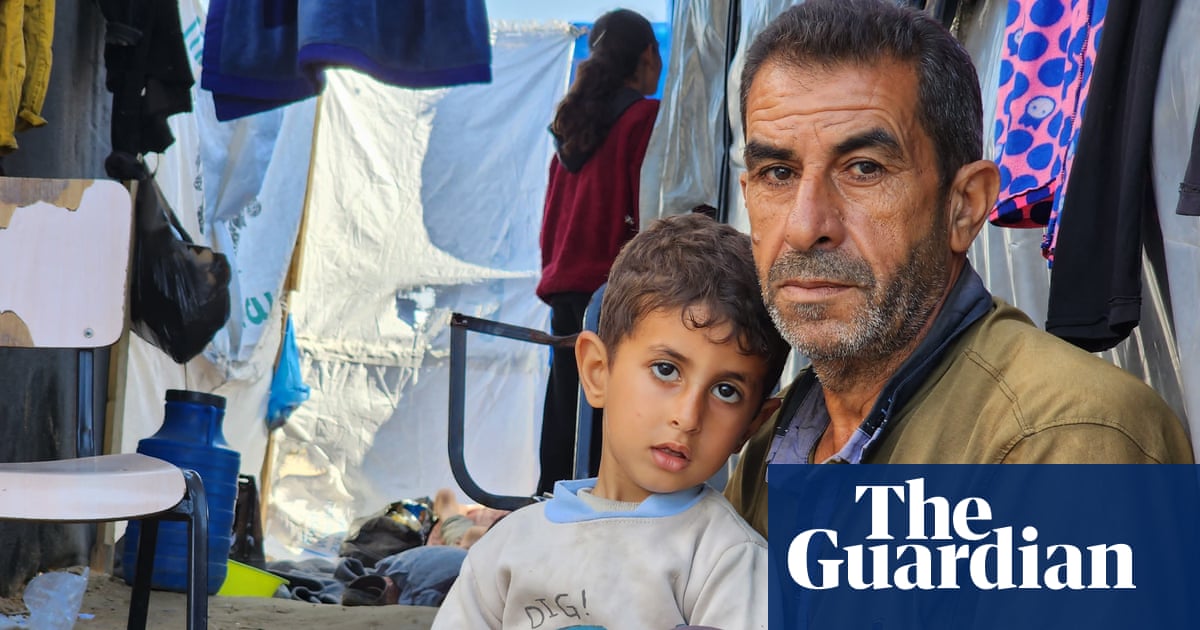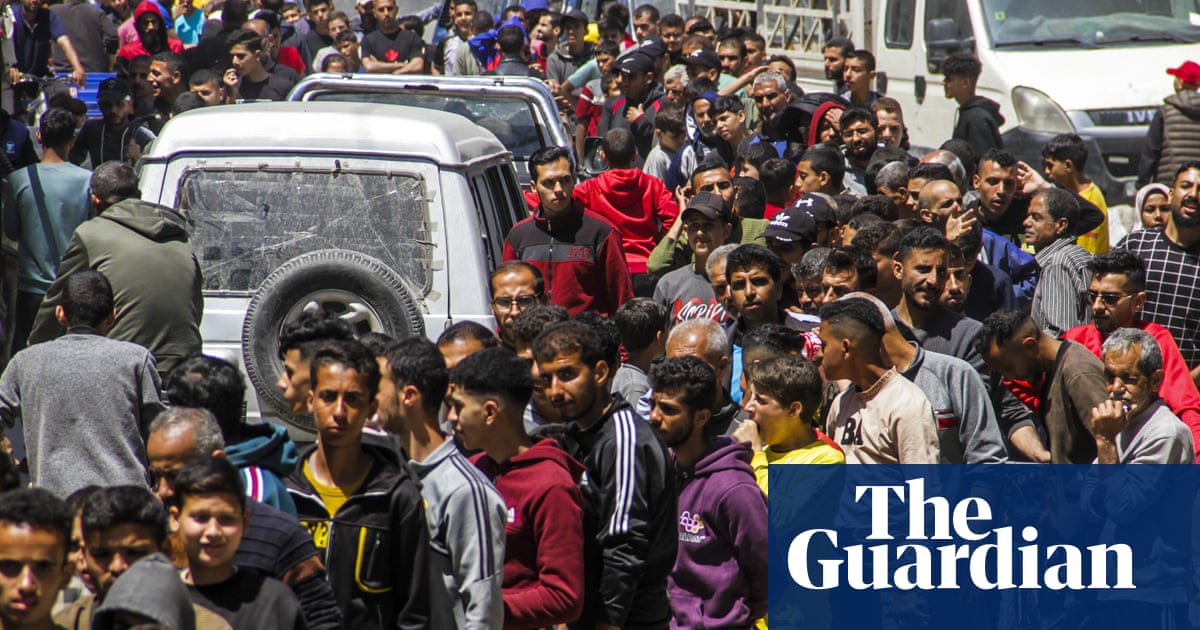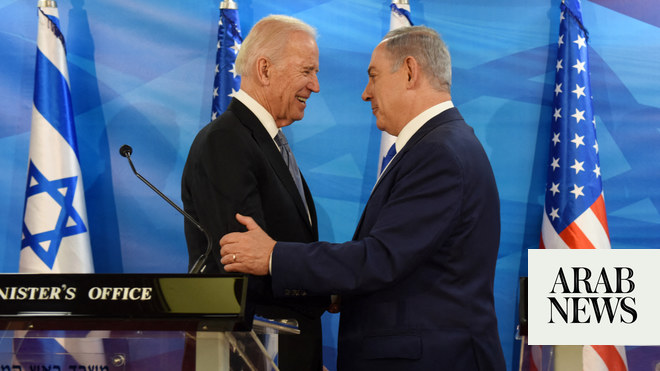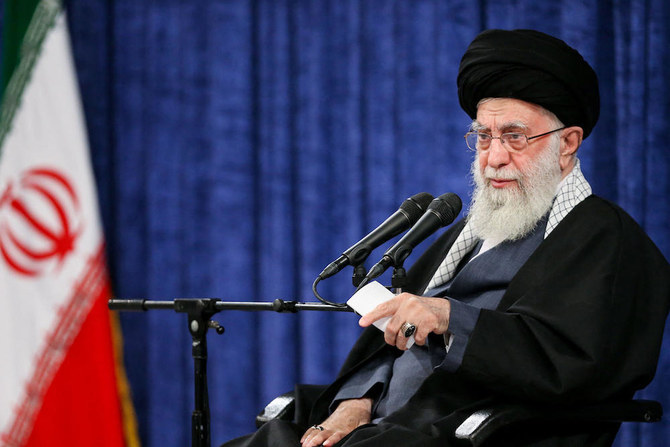
Iran’s attack on Israel tested the country’s air defences, but repaired – at least temporarily – Tel Aviv’s fractured relationship with Washington, and pushed the war and the looming famine in Gaza out of the headlines and down the diplomatic agenda.
In Gaza, where almost all the civilian population is displaced and hungry after more than six months of war, this shift in attention has been felt acutely.
“Countries and peoples were sympathetic to us, but now sympathy has shifted to Israel,” said Bashir Alyan, a 52-year-old former employee of the Palestinian Authority, who is now living in a tent in Rafah with his five children. “Israel became the victim overnight.”
He has watched the sudden shift in diplomatic focus, because his family’s lives depend on it. They are mostly living off food aid provided by Unwra, the UN agency for Palestinian refugees, and eat only two meals a day. He has lost 20kg (44lb) in weight in six months.
“The international pressures that were being exerted on Israel to bring in more aid and to stop the aggression against Gaza are now a thing of the past,” he said, though he has no time for Iran either. “Iran’s issues are not our issues. It only pursues its own interests.”
The US president, Joe Biden, had been ramping up pressure on Israel to improve access for aid workers and let more aid into Gaza, particularly after the killing of seven people working for the food agency World Central Kitchen in March.
The US aid chief, Samantha Power, last week became the country’s first official to confirm that famine was beginning to take hold in the territory. In the US and the UK, there were discussions about the legality of arms sales to Israel, given conditions in Gaza.
In response, Israel had promised to “flood” Gaza with aid, improve coordination with humanitarians so they could deliver aid without risk of being attacked, open crossings directly to the north of Gaza where famine is most extreme, and allow food to arrive through its Ashdod port.
Compliance over these measures had been mixed, with one northern crossing now open, but the UN – which provides almost all the food aid in Gaza at the moment – is not yet allowed to use it. However, the Israeli prime minister, Benjamin Netanyahu, had appeared to be shifting position slightly.
The unprecedented attack by Iran over the weekend, in response to an Israeli strike on a diplomatic compound in Damascus, in effect forced the US and other allies to set aside differences and rally around Israel.
“With all eyes on the dangerous escalation between Israel and Iran, we’re concerned that Gaza will be abandoned,” said Tania Hary, the executive director of Gisha, an Israeli NGO set up to protect the freedom of movement of Palestinians, particularly those in Gaza.
“The steps that have been taken in the past month to expand access are woefully and dangerously inadequate and don’t meaningfully address the crisis, but whatever is happening is happening only because of international pressure. With so many lives hanging in the balance, the world can’t afford to look away.”
The US seems so distracted that key officials are barely keeping track of aid shipments that last week they claimed were a priority.
The White House national security spokesperson, John Kirby, said in an interview on Monday that the US was still committed to getting more aid to civilians in the territory. “Our policy with respect to Gaza will change if we don’t see significant changes over time,” he said.
But he also said about 2,000 trucks of aid had arrived over the past week. That was far higher than UN figures for the period, and – even if correct – is still barely half the 500 trucks a day that Israel and the UN have said are needed to ease the looming famine in Gaza.
Israeli figures for aid shipments are slightly higher, but they include trucks arriving to a holding area just inside the border, while the UN counts those driving from this area into Gaza. The UN’s trucks always leave fully loaded, while Israel allows partly loaded shipments.
There are also rising concerns that with the world focused on threats from Iran, Israel may follow through on a pledge to send troops into Rafah, the city at Gaza’s southern edge that is the only place in the strip which has not seen intense fighting.
The Israeli military said on Sunday it was calling up two brigades of reserves “for operational activities on the Gazan front” without clarifying further.
“If these troops are brought into Rafah, it will be a disaster,” said Hikmat al-Masry, a 48-year-old academic and mother-of-one from Gaza City who has taken refuge in the southern city.
“This is the lung through which all the residents of the Gaza Strip breathe. It is the only crossing point for aid to enter,” she said. “Where will all these many refugees go?”
More than 1 million people are living in tents and makeshift shelters there, after fleeing fighting farther north. The US has said that Israel cannot proceed with the operation unless it has a clear plan to protect civilians.
Netanyahu says four Hamas battalions are hiding in Rafah, and plans for an operation have been approved, but he has not set a date for the operation.
Iran’s attack has already distracted attention from airstrikes and fighting on the ground that have killed tens of thousands of Palestinians.
The death toll has risen to more than 33,700, the majority women and children, according to Gaza’s Hamas-controlled ministry of health. Israel launched the war after Hamas killed about 1,200 people, most of whom were civilians, in a cross-border attack on 7 October.
Al-Masry said: “While Israel was being subjected to an attack from Iran which [killed] no one, we were being attacked with all cruelty from Israel, without anyone paying attention to us.
“The situation here is tragic, to say the least, because the war has continued for more than six months and without serious intervention from the influential countries in the world to stop it.”












